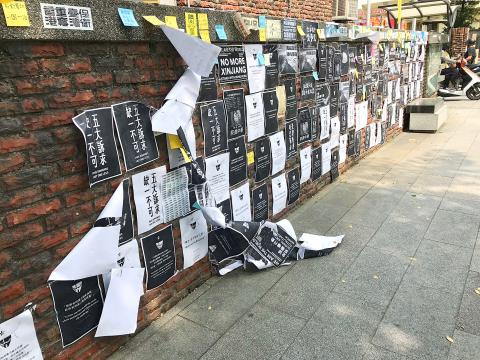The slew of incidents involving Chinese students vandalizing pro-Hong Kong democracy “Lennon walls” on campuses in Taiwan and threatening Hong Kong students are a manifestations of a collective anxiety, National Tsing Hua University professor Cheng Chih-peng (鄭志鵬) said yesterday.
Since Taiwan allowed Chinese students to study in Taiwan in 2011, they have never made such an aggressive political statement, not even during the Sunflower movement and Hong Kong’s “Umbrella movement,” Cheng said.
He cited three possible causes of anxiety among Chinese students in Taiwan.

Photo: Liu Wan-chun, Taipei Times
First, Chinese President Xi Jinping (習近平) has been pushing the so-called “Chinese dream” since his rise to power, elevating Chinese ethnocentrism, he said.
With China’s rapidly growing economic power, ethnocentrism has prompted Chinese to seek recognition from the international community, he said.
However, some Chinese students studying abroad feel anxious, because many countries are not so friendly toward China, he said, adding that incidents of Chinese students seeking to impose their views on others have not only occurred in Taiwan, but also in Western countries.
Second, the anti-extradition bill movement in Hong Kong has showen many Taiwanese that Beijing reneged on the promise that it would maintain a “one country, two systems” policy there, which has increased Taiwanese’s distrust of the Chinese government, making unification with Taiwan even more unlikely, he said.
Third, Taiwanese students have become increasingly aware of the “Chinese factor” and more vigilant of China’s tactics to influence Taiwanese society, which is a source of contention between Taiwanese and Chinese students, especially during discussions of public affairs, Cheng said.
Regarding speculation that alleged vandalism of Lennon walls by Chinese students had been orchestrated, Cheng said that people should not view Chinese students as a group that cannot be reasoned with, but should try to understand what has made them anxious.
Cheng said he could not approve of the Ministry of Education leaving incidents of vandalism in the hands of universities.
The ministry should set a standard for dealing with such incidents to prevent inadequate policies being set by institutions, he said.
Cheng said he could not agree with Immigration Agency Director-General Chiu Feng-kuang’s (邱豐光) statement that if Chinese sabotage Lennon walls, they could be barred from re-entering the nation.
It is generally accepted that students should be given a second chance if they have made a mistake at university, so the authorities should not have a “double standard” on this matter, he said.
Puma Shen (沈伯洋), an associate professor in National Taipei University’s Graduate School of Criminology, said that similar incidents have occurred in other countries, so Taiwan needs to introduce a model to handle conflicts on campus to better manage risks.
The authorities should provide counseling to Chinese studying in the nation and help them form an understanding of the predominant public opinion to help them interact with classmates, Shen said.
Students from both sides should keep in mind that the point is to exchange ideas, which should be based on democratic values, he said.
If Taiwan cannot abide by democratic institutions, it would defeat the purpose of allowing in Chinese exchange students, he said.
Academic exchanges are a way for Taiwanese to win the approval of young Chinese, so the vandalism of the Lennon walls should not be treated in a manner that would only escalate hostility, he said.

Alain Robert, known as the "French Spider-Man," praised Alex Honnold as exceptionally well-prepared after the US climber completed a free solo ascent of Taipei 101 yesterday. Robert said Honnold's ascent of the 508m-tall skyscraper in just more than one-and-a-half hours without using safety ropes or equipment was a remarkable achievement. "This is my life," he said in an interview conducted in French, adding that he liked the feeling of being "on the edge of danger." The 63-year-old Frenchman climbed Taipei 101 using ropes in December 2004, taking about four hours to reach the top. On a one-to-10 scale of difficulty, Robert said Taipei 101

Taiwanese and US defense groups are collaborating to introduce deployable, semi-autonomous manufacturing systems for drones and components in a boost to the nation’s supply chain resilience. Taiwan’s G-Tech Optroelectronics Corp subsidiary GTOC and the US’ Aerkomm Inc on Friday announced an agreement with fellow US-based Firestorm Lab to adopt the latter’s xCell, a technology featuring 3D printers fitted in 6.1m container units. The systems enable aerial platforms and parts to be produced in high volumes from dispersed nodes capable of rapid redeployment, to minimize the risk of enemy strikes and to meet field requirements, they said. Firestorm chief technology officer Ian Muceus said

MORE FALL: An investigation into one of Xi’s key cronies, part of a broader ‘anti-corruption’ drive, indicates that he might have a deep distrust in the military, an expert said China’s latest military purge underscores systemic risks in its shift from collective leadership to sole rule under Chinese President Xi Jinping (習近平), and could disrupt its chain of command and military capabilities, a national security official said yesterday. If decisionmaking within the Chinese Communist Party has become “irrational” under one-man rule, the Taiwan Strait and the regional situation must be approached with extreme caution, given unforeseen risks, they added. The anonymous official made the remarks as China’s Central Military Commission Vice Chairman Zhang Youxia (張又俠) and Joint Staff Department Chief of Staff Liu Zhenli (劉振立) were reportedly being investigated for suspected “serious

American climber Alex Honnold is to attempt a free climb of Taipei 101 today at 9am, with traffic closures around the skyscraper. To accommodate the climb attempt and filming, the Taipei Department of Transportation said traffic controls would be enforced around the Taipei 101 area. If weather conditions delay the climb, the restrictions would be pushed back to tomorrow. Traffic controls would be in place today from 7am to 11am around the Taipei 101 area, the department said. Songzhi Road would be fully closed in both directions between Songlian Road and Xinyi Road Sec 5, it said, adding that bidirectional traffic controls would